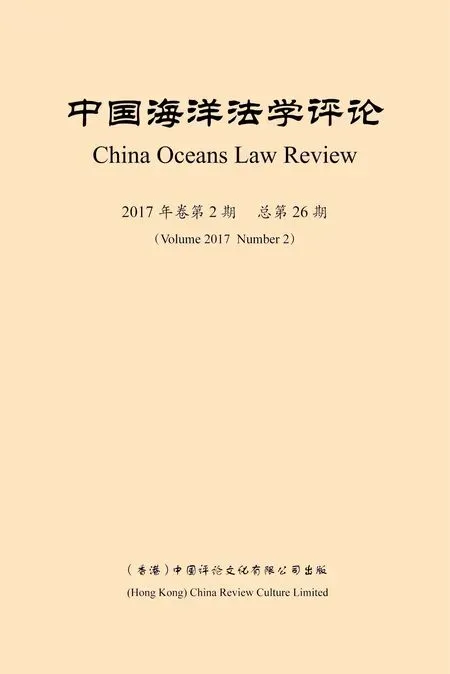EDITOR’S NOTE
The current Issue of China Oceans Law Review covers discussions on fisheries, continental shelf, the International Seabed Authority and Arctic governance.
Most countries tend to subsidize their fisheries sectors by providing subsidies to fishing activities. Currently, WTO members are negotiating new disciplines on fisheries subsidies. Although new disciplines on fisheries subsidy have not been concluded, most members, to some extent, have agreed that certain fisheries subsidies should be prohibited, and that developing members may enjoy exceptions under the special and differential treatment (SDT). WU Yingying analyzes the issues relating to the SDT for developing members in the WTO negotiations on fisheries subsidies. After comparing the controversial issues before and after 2011, she explores reasons lying behind the changed focuses of the most controversial issues in the context of SDT.
The Whaling in the Antarctic Case (Australia v. Japan: New Zealand intervening) dealt with the interpretation of specific provisions of the 1946 International Convention for the Regulation of Whaling (ICRW) and its complementary instruments. The decision of the International Court of Justice was a remarkable good one. However, its rigorous reasoning focused almost exclusively on the required purpose of “scientific research” of the JARPA II Programme permits as set out in the ICRW, approaching the convention as an autonomous self-contained regime, which leaves aside other additional sources of international law ruling Antarctic spaces and species. Lilian del Castillo, a scholar from Argentina, explores this case from this perspective.
Effective occupation is a key step for a State to acquire, in accordance with the occupation principle of international law, sovereignty over a territory. In case of a remote, desolate and unlivable territory, it is enough if the occupying State exercises or displays acts of sovereignty appropriate to the circumstances of the territory. The Nansha Islands of China is far away from Chinese mainland, and the natural conditions there are harsh. Ever since ancient times,fishery exploitation has been used by China as one of the most important ways to develop and administrate the Nansha Islands. CHU Xiaolin, based on the fishery history of the Nansha Islands, not only demonstrates that China first discovered the Nansha Islands, but also proves that China has exercised jurisdiction over this group of islands appropriate to its circumstances, with a view to managing the local fishing activities. Therefore, China has effectively occupied the Nansha Islands, and enjoys the sovereignty over it.
The issue of continental shelf beyond 200 nautical miles relating to ridges is one of most complex and contentious parts of UNCLOS Article 76. A coastal State may greatly extend, by invoking the ridge provisions, the outer limits of its extended continental shelf. Since the region of mid-oceanic ridges involves huge economic interests, it becomes a place that all coastal States want to claim in their scrambles for continental shelves. The coastal States’ intention to extend their shelves to the maximum extent by using the ridge provisions to their advantage would, necessarily, compromise the common interests of the humankind. Against this backdrop, LI Jinrong examines the typical submissions involving ridge provisions, and explores the principles for the application of ridge provisions, with a view to protecting China’s maritime rights and interests.
The Agreement Relating to the Implementation of Part XI of the United Nations Convention on the Law of the Sea of 10 December 1982 is an achievement of the UN Secretary General’s informal consultations from 1990 to 1994. The Enterprise regime has been dramatically changed in many ways with the adoption of this agreement. Envisaged as an operational organ of the International Seabed Authority, the outlook of the Enterprise is still unknown.In this connection, CHANG Hong highlights a few questions which need to be answered urgently, and proposes the way forward for the operationalization of the Enterprise in terms of legal principles and institutional design.
The Arctic Council celebrated its 20th birthday in 2016. During the last two decades, the Council has played a crucial role in Arctic governance. However,with the change of world situation, defects inherent in the Council appeared one by one. Yet, there are still immense hurdles to a comprehensive reform of the Council, due to its indefinite goal, lack of momentum and structural deficiencies. After analysis, DONG Limin finds that a tendency of domainal governance emerged in the recent scenario of Arctic governance, which gives the international community a new perspective to the devising of a strategy for building regional order.
A new year is approaching. We sincerely appreciate the support of our readers, and expect great progress in the coming year.
Databases:
Westlaw China http://www.westlawchina.com/index_cn.html
CNKI http://www.cnki.net/
Lawinfochina.com http://www.lawinfochina.com/
Airiti http://www.airitilibrary.com/
Cqvip http://www.cqvip.com/
Lawy.org http://lawy.org/
Duxiu http://www.cqvip.com/
Heinonline http://home.heinonline.org/
Website: http://colr.xmu.edu.cn/
Facebook: https://www.facebook.com/COLawRev/
WeChat Official Account: COLReview

